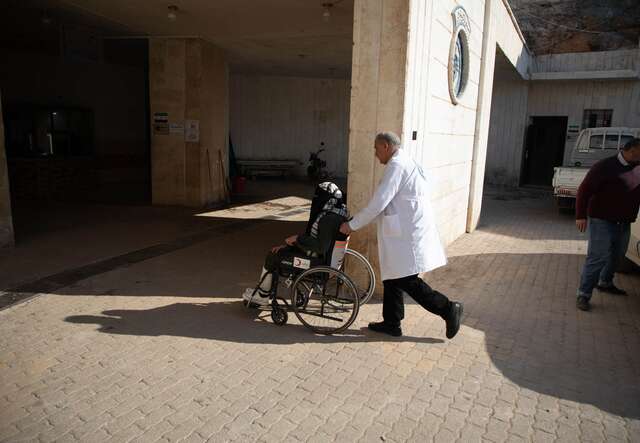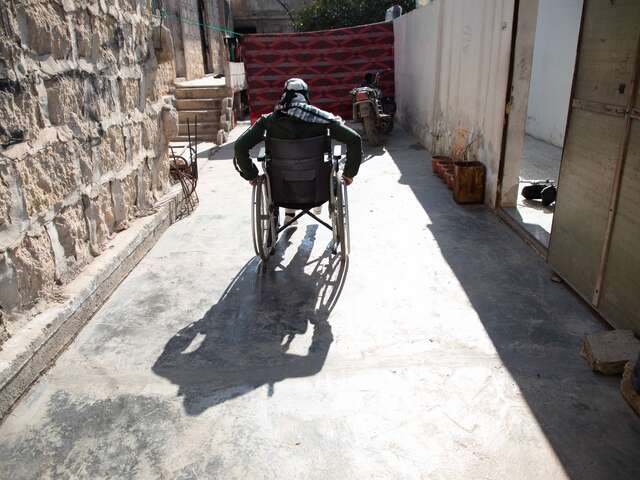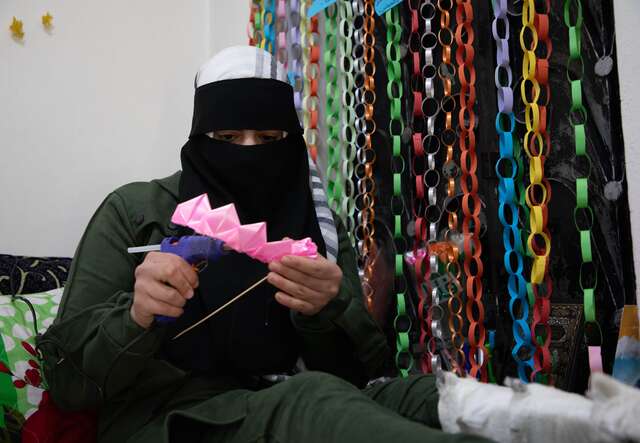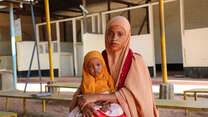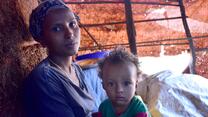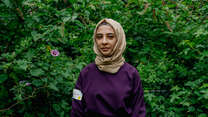After Syria’s devastating earthquake in February 2023, countless lives were shattered, leaving many survivors grappling with profound loss. One of those affected is Huda*. When the earthquake hit her home, she suffered a spinal cord injury, a fractured leg, and partial paralysis, and doctors gave her little hope for recovery. But Huda refused to give up. She underwent multiple surgeries, battled a severe infection, and slowly began to rebuild her life. Against the odds, she returned to her studies and earned a teaching degree. Today, she finds purpose in the classroom and uses her experience to make a difference in her community.
Surviving the earthquake
Huda, a 25-year-old Syrian woman, is one of the survivors of the February 2023 earthquake that struck her hometown of Al-Atarib in northern Syria.
She was at home when the earthquake hit; however, it wasn’t until two weeks later that she was able to recall what had happened. Huda was trapped under a collapsed wall while trying to save her brother and grandfather.
Unfortunately, her grandfather did not survive.
At the time of the earthquake, Huda was enrolled in the Teacher Training Institute, pursuing her dream of becoming a teacher.
From tragedy to treatment
Huda was first taken to Al-Maghara Hospital where the doctors found that her back was badly injured. She was later moved to a hospital in Idlib, in northwestern Syria, for more tests and there she was told that her spine was broken and her leg was also fractured. Huda could not feel her legs, she had become partially paralyzed.
“They [the doctors] told me I was partially paralyzed,” Huda shares.
Photo: Ali Haj Suleiman for the IRC
Since that moment and her first hospitalization, Huda has fought a long and hard battle to recover from her serious injuries and adapt to a new and very different life.
Over two years, she underwent a multitude of hospitalizations and heavy treatments, preventing her from returning to university.
She first underwent surgery at Bab Al-Hawa Hospital, where doctors performed technical procedures including a vertebral fixation and the placement of an external fixator on her leg.
After returning home, she continued her treatment at Al-Atarib Hospital, a facility supported by the IRC and funded by the EU, which was nearby and made access to care easier.
At a time when northwest Syria is grappling with a healthcare crisis, with many hospitals and medical facilities heavily damaged by airstrikes and landmines, EU financial support remains crucial. It ensures that specialized health departments can continue operating and offer a lifeline to people affected by disaster and conflicts—people like Huda.
Later in her treatment, Huda underwent another surgery to remove the external fixator. Initially, her leg was fractured, and after the external fixation, the device was replaced with an internal implant, which unfortunately became inflamed.
Battling setbacks and recovery
Huda's condition is currently stable, and she visits Al-Atarib Hospital every two days for bandaging. The hospital offers emergency trauma and surgical services and used to be the only hospital accessible to communities living near the frontlines of the conflict.
At the moment, she is unable to stand or walk due to her leg’s condition. However, after her initial injury and a period of treatment, she showed improvement.
Huda was able to stand and even began walking with a walker. Her progress continued until inflammation set in, which severely hindered her movement and ability to stand.
As a result, she had to stop physiotherapy and shift her focus to treating the fracture. Despite these challenges, she remains hopeful about her recovery.
Continuing her studies
Huda was in her second year at the Teacher Training Institute when she sustained her injury. She had two semesters left, along with three subjects from the first semester. Her injury initially prevented her from continuing her studies.
At the institute, faculty members asked her what kind of work she could still do and how she could complete her practical lessons and assignments for evaluation.
Refusing to let her injury hold her back, Huda found a way to complete her practical lessons and written assignments, ensuring she could continue working toward her dream.
“I didn’t let my injury stop me—I found a way to work on practical lessons and written assignments.”
Huda successfully managed to complete her practical lessons and applied to the institute that year. The following year, she resumed her studies and started attending the institute again despite using a wheelchair.
Nurse Yousef*, 53, pulls Huda*'s wheelchair, 25, entering her into the emergency department at “Al-Maghara" Hospital in Atarib, western Aleppo countryside, northwestern Syria to change the dressing on her broken leg.
Photo: Ali Haj Suleiman for the IRC
Overcoming obstacles
At first, Huda was hesitant. She was not sure whether she should go to the institute as she wondered how she would face the world and interact with others. However, she eventually decided to go and confront the challenges ahead.
“But then I realized—I am a normal human being, no different from anyone else,” Huda shares.
Huda went through a difficult phase for about nine months, constantly thinking about how she would continue her studies, how she would face society, and how she would grow stronger. Most importantly, Huda knew she needed to build her self-confidence and stop focusing on her injury in order to complete her studies.
Huda's dream is to become a teacher. She loves the positive interactions with her students, knowing that she is sharing knowledge and helping them grow.
Photo: Ali Haj Suleiman for the IRC
Finding joy in teaching
Her passion for teaching brought her joy.
“I prepared my lessons with energy and enthusiasm.”
However, her teaching journey was cut short when she broke her leg, forcing her to stop. Though she is currently unable to continue teaching, she refuses to give up on her dreams. Huda’s plan is to return to university and resume her studies, determined to complete her studies.
At home in Atarib, western Aleppo countryside, northwestern Syria Huda*, 25, places the petals made from pink ribbons in a row and glues them together using glue to start forming a flower.
Photo: Ali Haj Suleiman for the IRC
*Names have been changed for privacy
About our work with the European Union
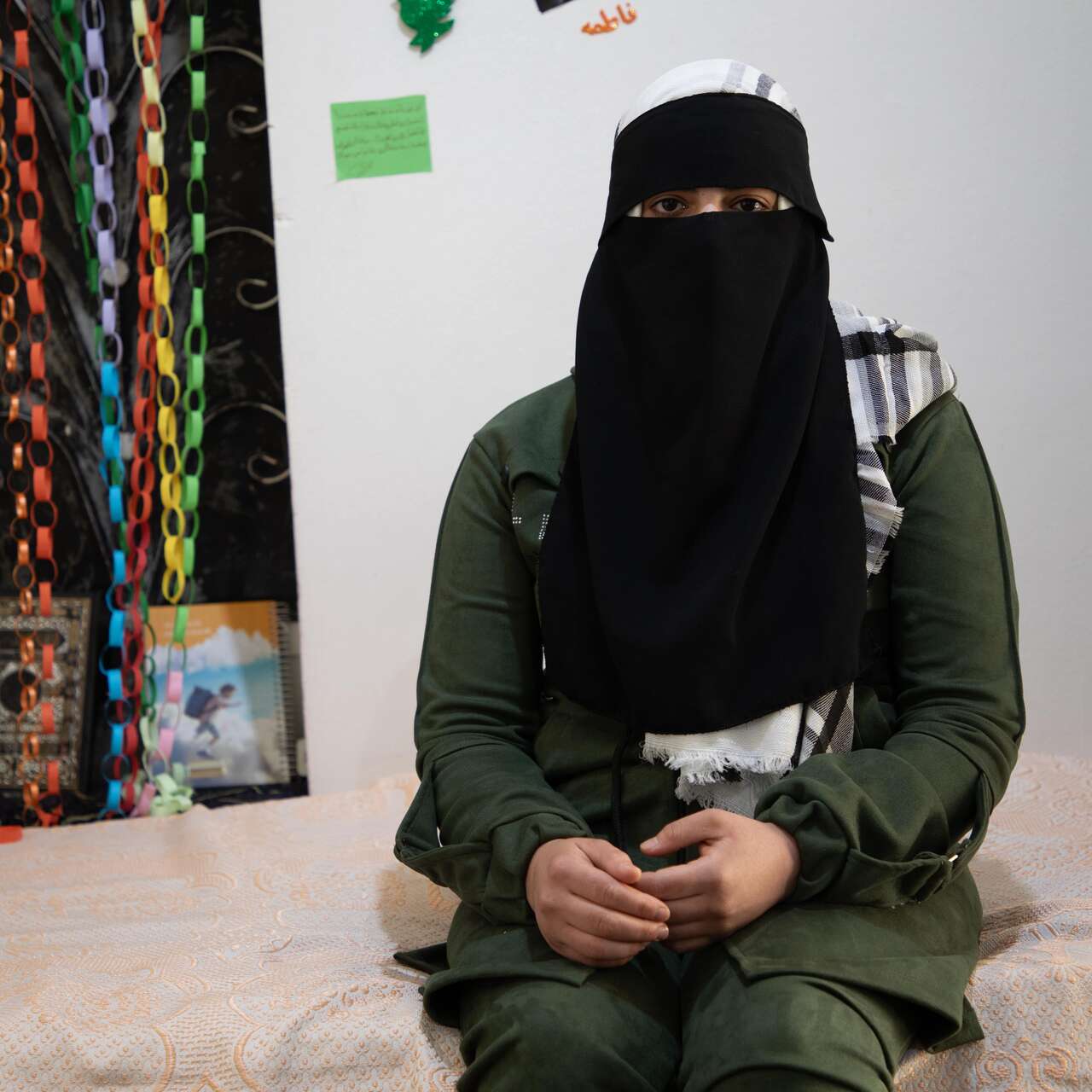
![“They [the doctors] told me I was partially paralyzed,” Huda shares.](/sites/default/files/styles/well_width_13x9_640px_wide/public/2025-07/20250129-Syria-AHajSulieman-Health-070-min.jpg?itok=WkNhmArx)
